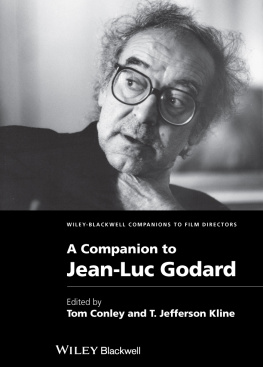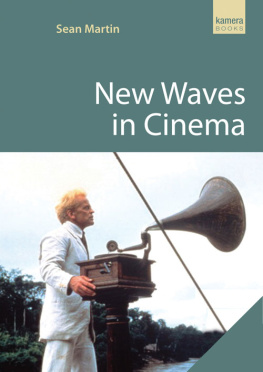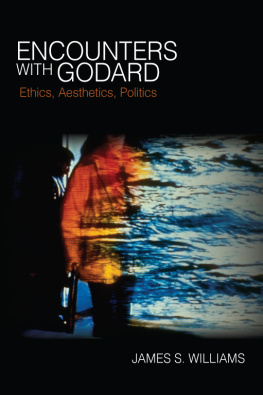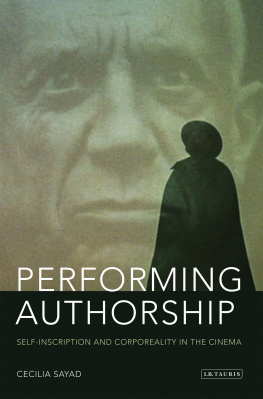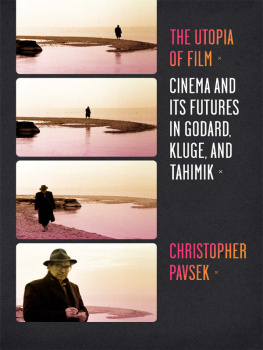Godard Jean-Luc - Jean-Luc Godard, Cinema Historian
Here you can read online Godard Jean-Luc - Jean-Luc Godard, Cinema Historian full text of the book (entire story) in english for free. Download pdf and epub, get meaning, cover and reviews about this ebook. City: Bloomington;Ind, year: 2013, publisher: Indiana University Press, genre: Non-fiction. Description of the work, (preface) as well as reviews are available. Best literature library LitArk.com created for fans of good reading and offers a wide selection of genres:
Romance novel
Science fiction
Adventure
Detective
Science
History
Home and family
Prose
Art
Politics
Computer
Non-fiction
Religion
Business
Children
Humor
Choose a favorite category and find really read worthwhile books. Enjoy immersion in the world of imagination, feel the emotions of the characters or learn something new for yourself, make an fascinating discovery.

- Book:Jean-Luc Godard, Cinema Historian
- Author:
- Publisher:Indiana University Press
- Genre:
- Year:2013
- City:Bloomington;Ind
- Rating:4 / 5
- Favourites:Add to favourites
- Your mark:
- 80
- 1
- 2
- 3
- 4
- 5
Jean-Luc Godard, Cinema Historian: summary, description and annotation
We offer to read an annotation, description, summary or preface (depends on what the author of the book "Jean-Luc Godard, Cinema Historian" wrote himself). If you haven't found the necessary information about the book — write in the comments, we will try to find it.
Jean-Luc Godard, Cinema Historian — read online for free the complete book (whole text) full work
Below is the text of the book, divided by pages. System saving the place of the last page read, allows you to conveniently read the book "Jean-Luc Godard, Cinema Historian" online for free, without having to search again every time where you left off. Put a bookmark, and you can go to the page where you finished reading at any time.
Font size:
Interval:
Bookmark:
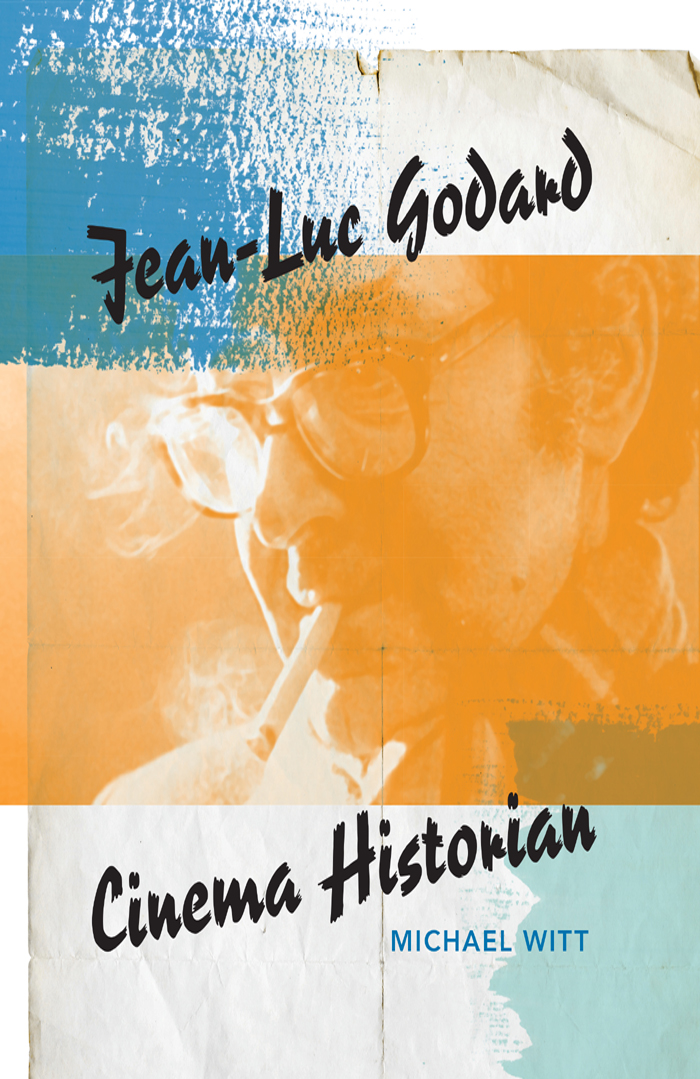
Jean-Luc Godard,
Cinema Historian
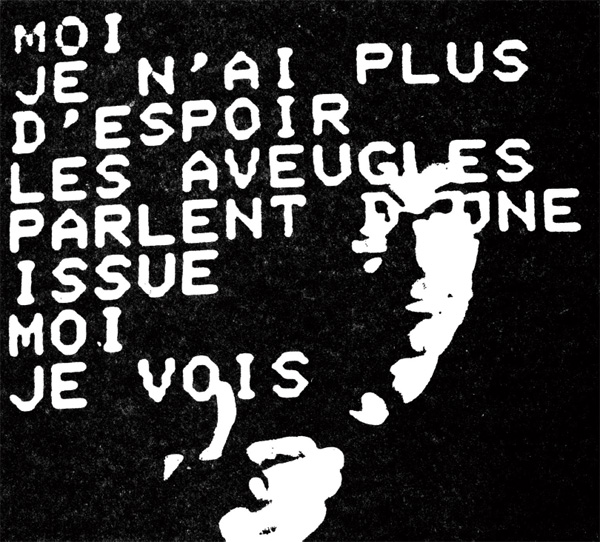
Me /I no longer have any / hope / the blind
/ speak of a / way out / me /I see. From
Jean-Luc, episode 2b of Six fois deux (Sur et
sous la communication) (Anne-Marie Miville
and Jean-Luc Godard, 1976). Reproduced in
Godard, Introduction une vritable histoire
du cinma (ditions Albatros, 1980).

This book is a publication of
Indiana University Press
Office of Scholarly Publishing
Herman B Wells Library 350
1320 East 10th Street
Bloomington, Indiana 47405 USA
iupress.indiana.edu
Telephone orders 800-842-6796
Fax orders 812-855-7931
2013 by Michael Witt
All rights reserved
No part of this book may be reproduced or utilized in any form or by any means, electronic or mechanical, including photocopying and recording, or by any information storage and retrieval system, without permission in writing from the publisher. The Association of American University Presses Resolution on Permissions constitutes the only exception to this prohibition.
This book is printed on acid-free paper.
Manufactured in China
Library of Congress Cataloging-in-Publication Data
Witt, Michael.
Jean-Luc Godard, cinema historian / Michael Witt.
pages cm
Includes bibliographical references and index.
ISBN 978-0-253-00722-3 (cloth)ISBN 978-0-253-00728-5 (pbk.)ISBN 978-0-253-00730-8 (e-book) 1. Godard, Jean-Luc, 1930- -Criticism and interpretation. 2. Godard, Jean-Luc, 1930 Histoire(s) du cinma. 3. Motion pictures and history. I. Title.
PN1998.3.G63W58 2013
791.4302'33092dc23
2013005861
1 2 3 4 5 18 17 16 15 14 13
FOR ALEX, WITH LOVE
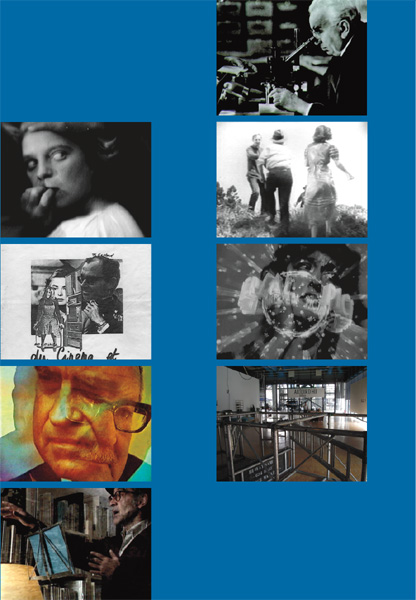
Contents
Acknowledgments
I would like to Thank Michael Lundell for commissioning this book, and Jane Behnken and Raina Polivka for seeing it through to completion with great care. I am also extremely grateful to Michael Temple and Nicole Brenez for their incisive feedback on the manuscript.
In addition, I am indebted to the following for their generosity, help, and support of various kinds: Derek Allan, Timothy Barnard, Nil Baskar, Raymond Bellour, Janet Bergstrom, Martine Beugnet, Christa Blmlinger, Nika Bohinc, Agns Calatayud, Michael Chanan, Stuart Comer, Chris Darke, Gilles Delavaud, Bernard Eisenschitz, Dror Elkivity, Wendy Everett, Jol Farges, David Faroult, Laetitia Fieschi-Vivet, Monica Galer, Augustin Gimel, Jean-Luc Godard, Roman Gutek, Junji Hori, Youssef Ishaghpour, Nick James, Maja Krajnc, Roland-Franois Lack, Jae Cheol Lim, Catherine Lupton, Laurent Mannoni, Adrian Martin, Ewa Mazierska, Jurij Meden, Douglas Morrey, Laura Mulvey, Dalia Neis, Dominique Pani, Mark Rappaport, Keith Reader, Wilfried Reichart, Jonathan Rosenbaum, Brad Stevens, Olivier Thvenin, Muriel Tinel, Thomas Tode, Ys Tran, Rob Tregenza, Michael Uwemedimo, James Williams, and Maxa Zoller. I am especially grateful to Paul Sutton, Head of the Department of Media, Culture and Language at the University of Roehampton, for the valuable support he has given this project. My sincere thanks, too, go to my other Roehampton colleagues, and to the archivists and librarians at the BFI National Library, Bibliothque nationale de France, Bibliothque de lArsenal, Inathque de France, Bibliothque du film, and Archives franaises du film.
Much of the initial research for this book was made possible by a grant from the Arts and Humanities Research Board. I am grateful to the following for commissioning or publishing earlier versions of some of the material included in it, and for permitting me to draw on parts of that work here: Perry Anderson, Emilie Bickerton, Susan Watkins, and Tony Wood at New Left Review; John Caughie at Screen; Raymond Bellour at Trafic; Elizabeth Ezra and Sue Harris, editors of France in Focus: Film and National Identity (Berg, 2000); Michael Temple and James Williams, editors of The Cinema Alone: Essays on the Work of Jean-Luc Godard, 19852000 (Amsterdam University Press, 2000); and Nicole Brenez, David Faroult, Michael Temple, and James Williams, with whom I co-edited Jean-Luc Godard: Documents (ditions du Centre Pompidou, 2006).
I am profoundly indebted to my late parents, Julie and Nigel, for their love and unwavering support. John and Frank and their respective families have also been a vital source of strength. Above all, I would like to express my heartfelt gratitude to my family Alex, Jack, Ella, and Violet Mo whose love, patience, encouragement, and good humor made it possible for me to write this book.
Jean-Luc Godard,
Cinema Historian
Introduction Godards Theorem
For the Past four decades, Jean-Luc Godard has pursued a sustained investigation of the theory and practice of audiovisual history. At the heart of his project lies one of his most ambitious and significant achievements to date: the monumental, labyrinthine cinema history series Histoire(s) du cinma. This is simultaneously a set of essays on the history of cinema and television; on Godards life, and his place within that history; on the history of cinema in the context of the other arts; on the history of film thinking; on the history of the twentieth century; on the interpenetration of cinema and that century; and on the impact of films on subjectivity. It is also a critique of the longstanding neglect by historians of the value of films as historical documents, and a reflection on the narrow scope and limited ambition of the type of history often produced by professional film historians. All I want to say, as he summed up this aspect of the series, is that history is badly told.
The polysemic histoire (meaning both history and story) and du in the title Histoire(s) du cinma are central terms. Their combination suggests not only a project about both cinema and history, and about all the stories told by cinema, but also the principle of a form of history derived materially from, and composed out of, the very stuff of cinema. Godards point of departure for the series was the idea of an audiovisual history of cinema based on the principle of reprojection or reproduction:
The history of cinema appears to be easy to do, since it is after all made up of images; cinema appears to be the only medium where all one has to do is re-project these images so that one can see what has happened. In normal history, one cant project, because its not projectable; one has to codify in one form or another, write, make manuscripts; whereas here it would seem that all one has to do is reproduce.
In addition to this underlying emphasis on audiovisual form, Godard frequently stressed the centrality to his vision of visual and audiovisual history of montage as a key compositional tool. Video allowed him not only to copy and combine archival film clips, but also to incorporate all manner of extracinematic sounds and images and to make these speak cinematically through montage:
In a striking manner, film was able to recount its own history in a way quite different from the other arts. And in montage alone, there was a story, or attempts at stories, told in films own language. One can put a Goya after an El Greco, and the two images recount something without the need for a caption. One doesnt see that anywhere else. Literature cant do it: Ive never seen a history of literature that simply puts a Cervantes and a Sartre side by side. Thats cinema. And for cinema, little by little, it could be done, and this principle would establish a cinematographic history.
Font size:
Interval:
Bookmark:
Similar books «Jean-Luc Godard, Cinema Historian»
Look at similar books to Jean-Luc Godard, Cinema Historian. We have selected literature similar in name and meaning in the hope of providing readers with more options to find new, interesting, not yet read works.
Discussion, reviews of the book Jean-Luc Godard, Cinema Historian and just readers' own opinions. Leave your comments, write what you think about the work, its meaning or the main characters. Specify what exactly you liked and what you didn't like, and why you think so.

